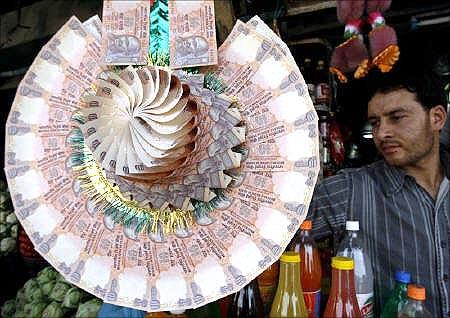
Why has the finance minister decided to tax 60 per cent of the PF corpus on withdrawal and allow only 40 per cent tax-free, asks Debashis Basu.
One of the most worrying features of this year’s Budget for the salaried middle class is a 60 per cent tax on retirement corpus created from the employees’ provident fund and superannuation fund.
This the first time that Provident Fund withdrawal is being taxed.
A saving grace is that the tax is only on contributions made after April 1, 2016. This means it will hit employees several years down the line.
Salaried employees are understandably miffed.
Just a few days ago, the government said only own contribution plus interest could be withdrawn, not the contribution from the employers until you retire.
It also extended the eligibility of withdrawal from 55 to 58 years.
Who knows whether the government will continue with the proposed taxability of the Employees' Provident Fund.
After all, governments have rolled back unpopular measures.
Why has the finance minister decided to tax 60 per cent of the PF corpus on withdrawal and allow only 40 per cent tax-free?
He has put this and the National Pension System on an equal footing by making 40 per cent of the withdrawal from NPS corpus tax-free.
While this move is logical, the government should have gone further if it was keen to rationalise the entire suite of retirement products.
Incentives, product design, taxation and regulation on retirement products leave savers confused and often lead them to make the wrong choices.
Retirement products are sold by six entities: The government (provident fund), banks (senior citizens savings’ scheme) insurance companies (annuities from pension plans), mutual funds (retirement funds), pension funds (under NPS) and post office.
There is no single taxation principle that unifies them.
There is a need to rationalise the products sold by multiple agencies.
Employer’s contribution towards an approved superannuation fund is exempt from tax up to Rs 100,000 per annum.
If the employer makes any contribution beyond Rs 100,000 such excess shall be taxable for the employer.
The Budget proposes employer contribution under superannuation schemes will now be limited to Rs 150,000, without attracting tax.
Contributions above Rs 150,000 will attract tax.
While on PF, the government will pay a contribution of 8.33 per cent for all new employees enrolling in the Employees’ Provident Fund Organisation for the first three years of their employment.
If you are a first-time borrower, you get an additional interest deduction of Rs 50,000 per annum for loans up to Rs 35 lakh (Rs 3.5 million) sanctioned in 2016-17, provided the cost of the house does not exceed Rs 50 lakh (Rs 5 million).
This deduction is over and above the maximum of Rs 200,000 interest deduction on self-occupied property under.
For those who live in rented houses and don’t get the benefit of house rent allowance, the deduction of rent paid under section 80GG has gone up from Rs 24,000 to Rs 60,000 a year.
The Budget has also raised the time period from three years to five years for the acquisition or construction of self-occupied house property for claiming deduction of interest under Section 24.
This will help a lot of taxpayers who lose out on tax breaks because of builders not delivering flats within three years.
The redemption of sovereign gold bond by an individual shall not be treated as transfer and, therefore, there will be no capital gains tax.
Also, long-terms capital gains arising on transfer of sovereign gold bond will benefit from indexation.
Interest on deposit certificates issued under the gold monetisation scheme will also be exempt from Income Tax.
Finally, for an annual dividend income of Rs 10 lakh (Rs 1 million) or more, the investor will pay a dividend distribution tax of 10 per cent.
But as the dividend yield of good-quality stocks is around two per cent, an investor will need to have a portfolio of Rs 5 crore (Rs 50 million) to begin paying this tax.
Overall, not much has changed for the salaried taxpayer. Your best investment choices for saving tax remain the same.
If you haven’t bought a house, do so and grab the tax benefits offered.
Invest your long-term surplus in stocks or equity mutual funds.
The image is used for representational purpose only. Photograph: Reuters
Debashis Basu is the editor of www.moneylife.in













 © 2025
© 2025